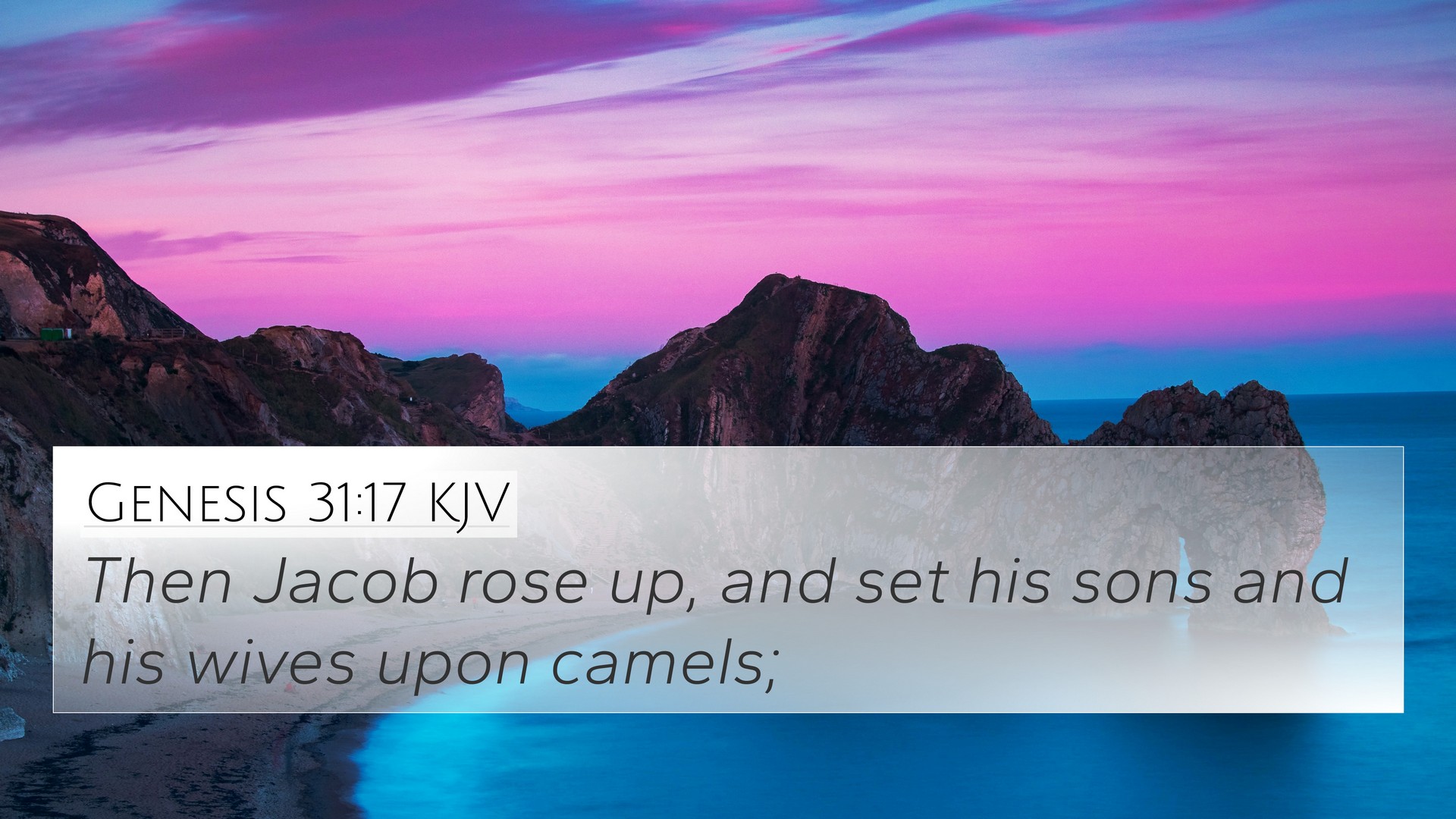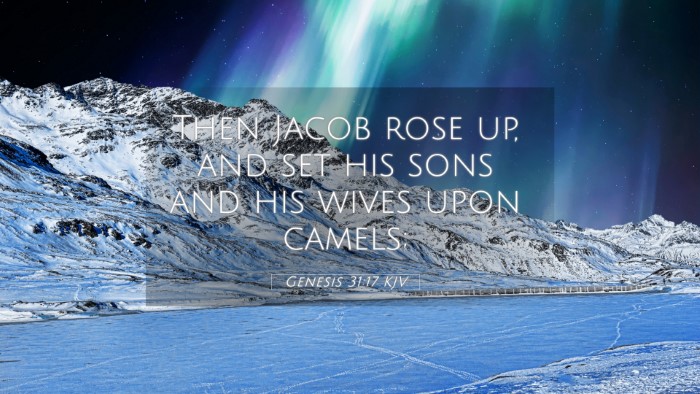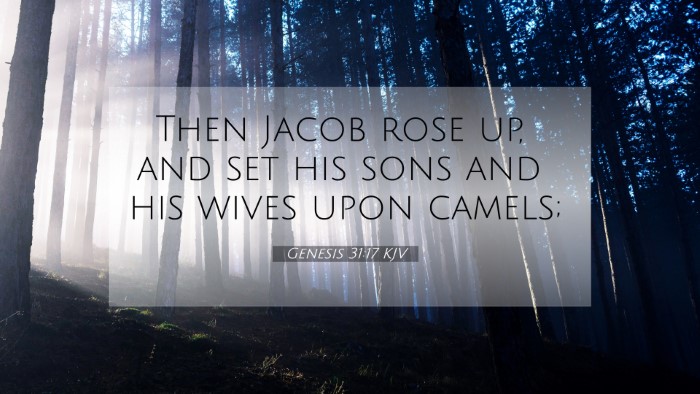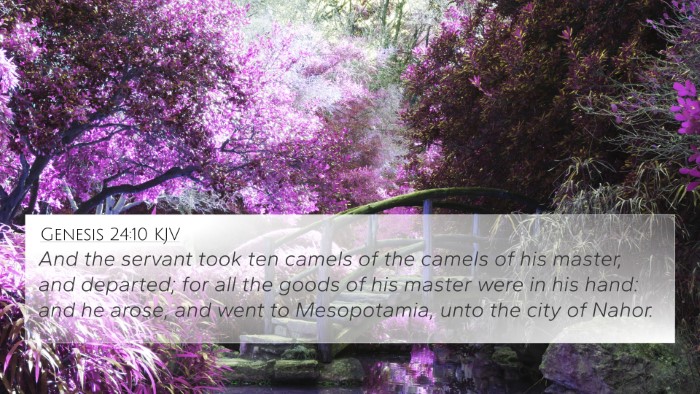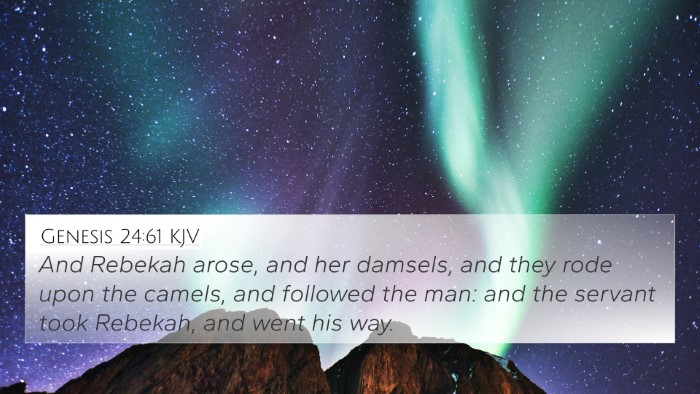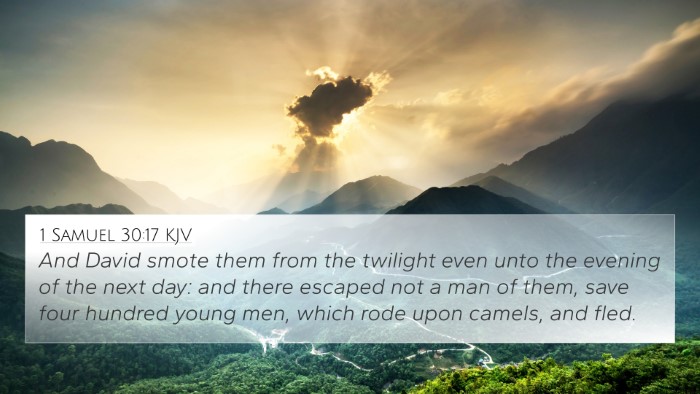Understanding Genesis 31:17
Verse: "Then Jacob rose up, and set his sons and his wives upon camels."
Genesis 31:17 marks a significant moment in the narrative of Jacob as he leaves Laban’s house. This verse sets the stage for Jacob's departure, reflecting themes of escape, family loyalty, and divine guidance.
Verse Meaning and Interpretation
This verse conveys Jacob's determination to leave his father-in-law, Laban, indicating a decisive turn in his life. The act of rising up suggests a response to God's call and a departure from a place where he had faced trials. The mention of his sons and wives being set upon camels signifies the importance of family in Jacob's journey and the practicalities involved in their departure.
Insights from Commentaries
Matthew Henry: Henry emphasizes Jacob's promptness to leave after receiving divine direction. He notes that Jacob's action illustrates obedience to God's will, demonstrating trust in the Lord's plan. The family aspect highlights the collective nature of their journey towards a promised future.
Albert Barnes: Barnes provides insight into the significance of camels in the ancient Near Eastern context, suggesting they symbolize wealth and mobility. This underscores Jacob's status and resourcefulness. He also discusses the emotional implications of leaving behind familiar surroundings and the uncertainty of the journey ahead.
Adam Clarke: Clarke interprets this departure as a critical juncture, where Jacob must confront his past while moving towards his future. He notes the strategic nature of Jacob's flight, indicating that Jacob was mindful of both his family’s safety and the steps necessary to reclaim his heritage.
Cross-References and Thematic Connections
Thematically, Genesis 31:17 resonates with various other scriptures that speak of departure, family, and God’s guidance. Here are some notable cross-references:
- Genesis 12:1 - The call of Abram to leave his country, similar to Jacob's call to leave Laban.
- Exodus 3:10 - God's command to Moses to lead the Israelites out of Egypt, paralleling the theme of divine mission.
- Matthew 2:13 - Joseph being instructed to take Mary and Jesus to Egypt reflects a protective journey akin to Jacob's departure.
- 1 Kings 19:15 - God instructs Elijah to go and anoint Elisha, indicating ongoing divine missions throughout Scripture.
- Genesis 45:9 - Joseph's instruction to his brothers to return to Jacob, tying together familial bonds amidst departure.
- Psalm 78:53 - The aspect of guidance through wilderness, reminiscent of Jacob's journey with his family.
- 1 Peter 1:1 - The theme of being a sojourner connects well with Jacob’s travels.
The Role of Cross-Referencing in Biblical Interpretation
Cross-referencing Bible texts provides a greater understanding of themes presented in individual verses. In this case, examining the connections between Genesis 31:17 and these related scriptures leads to deeper insights about family, divine guidance, and new beginnings.
Tools for Bible Cross-Referencing
To fully explore these connections, consider utilizing the following tools and methods:
- Bible Concordance: A comprehensive index that can help locate verses and their themes.
- Bible Cross-Reference Guide: Useful in identifying related scriptures based on major themes.
- Cross-Reference Bible Study: Group study methods which enable deeper discussion on interrelated scriptures.
- Bible Reference Resources: A wide array of books and online tools dedicated to scripture reference.
Conclusion
Genesis 31:17 not only depicts Jacob's pivotal decision to leave but also intertwines with numerous passages throughout the Bible that reinforce themes of faith, family, and obedience to God’s will. Through exploring these connections, readers can gain a comprehensive view of how different Biblical texts converse with one another, enriching their understanding of scripture and its applications in their lives.
